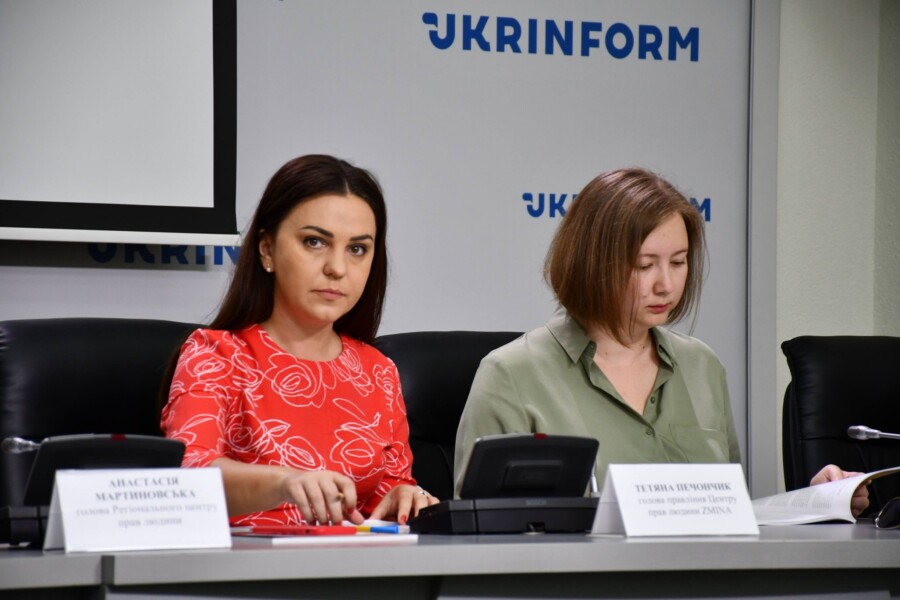Human rights situation in Crimea has deteriorated significantly over seven years of occupation – human rights activists
Over seven years of occupation, the human rights situation in Crimea has deteriorated significantly. The human rights activists made a corresponding statement during the presentation of a thematic report in Kyiv on June 15.

According to legal analyst Olena Vynohradova, the report covers and systematizes information on the situation with civil, political, economic, social, and cultural rights in Crimea over the seven years of occupation, and the document itself is unique in terms of content.
As noted by Olha Skrypnyk, head of the Crimean Human Rights Group, one of Russia’s strategic goals in Crimea has been to destroy freedom of speech and expression.
“Russia punishes Crimeans for thinking that Crimea is Ukraine. We were recording first such criminal cases in 2015, primarily they concerned journalists. In general, pressure on independent media began in 2014, many of outlets were later forced to move to mainland Ukraine,” Skrypnyk notes.
Moreover, Russia massively persecutes Crimean Muslims and accuses Crimean Tatars of involvement in the Islamic political party Hizb ut-Tahrir: 74 people are currently behind bars on these charges.
According to human rights organizations, at least 105 Ukrainian political prisoners are being held in places of detention in Crimea and Russia, and six more people are under house arrest.
 Olha Skrypnyk
Olha Skrypnyk“In total, there are at least 111 political prisoners in Russia and Crimea occupied by Russia. Of them, 84 people are Crimean Tatars, most of whom have already been convicted or face long sentences and severe punishments. The reasons for such politically motivated persecution are religion, civic activity, activism, journalistic activity,” says Tetiana Pechonchyk, head of the ZMINA Human Rights Center.
In addition, 44 enforced disappearances have been recorded over the years of occupation of the peninsula. The vast majority of cases (28) occurred in the first year of occupation, and the fate of 15 people is still unknown.
The occupying power also constantly violates the right to privacy: numerous raids are conducted on houses and enterprises of the Crimean people. The number of raids increases annually. Whereas 150 raids were recorded over the first three years of occupation, the figure reached 186 raids then over the next year and a half. Most raids were carried out in places of residence or permanent gatherings of Crimean Tatars.
According to head of the Regional Center for Human Rights Anastasiya Martynovska, Russia illegally detains Crimeans even for actions committed before the occupation, and the judiciary itself is biased and does not guarantee the right to a fair trial. The occupying power also violates the rights of lawyers in Crimea: they receive threats, attempts are made to deprive them of their lawyers’ certificates. There are also cases when lawyers are detained for their professional activities.
At the same time, the Ukrainian language in education is being eradicated in Crimea: the number of pupils studying in Ukrainian has seen 36-fold reduction compared to 2014, and the number of classes with Ukrainian as the language of instruction has decreased 31-fold.
“All textbooks on the history and culture of Ukraine were destroyed back in 2014. In addition, now there are almost no institutions in the occupied Crimea, where you can get knowledge of Ukrainian history and culture,” says Valentyna Potapova, head of the Center for Civic Education “Almenda”.
Human rights activists add that despite the international support for Ukraine in its fight against the occupation of Crimea, all human rights offenses on the peninsula remain uninvestigated and those responsible for them are not being prosecuted.
In addition, there are still no effective legal mechanisms to protect individual and collective rights and interests of Ukrainian citizens living in Crimea, human rights activists say.

“Therefore, monitoring and publications on human rights violations in the occupied territories similar to our report remain almost the only tool in the struggle for Ukrainian citizens in Crimea, for the protection of their rights and freedoms under occupation until Crimea is liberated,” the authors emphasize.
The report was prepared by Human Rights House Crimea: Crimean Human Rights Group, Regional Center for Human Rights, Center for Civic Education “Almenda”, and ZMINA Human Rights Center with the support of the Human Rights House Foundation.
The report is available in Ukrainian. Video of the presentation can be viewed here.
If you have found a spelling error, please, notify us by selecting that text and pressing Ctrl+Enter.















